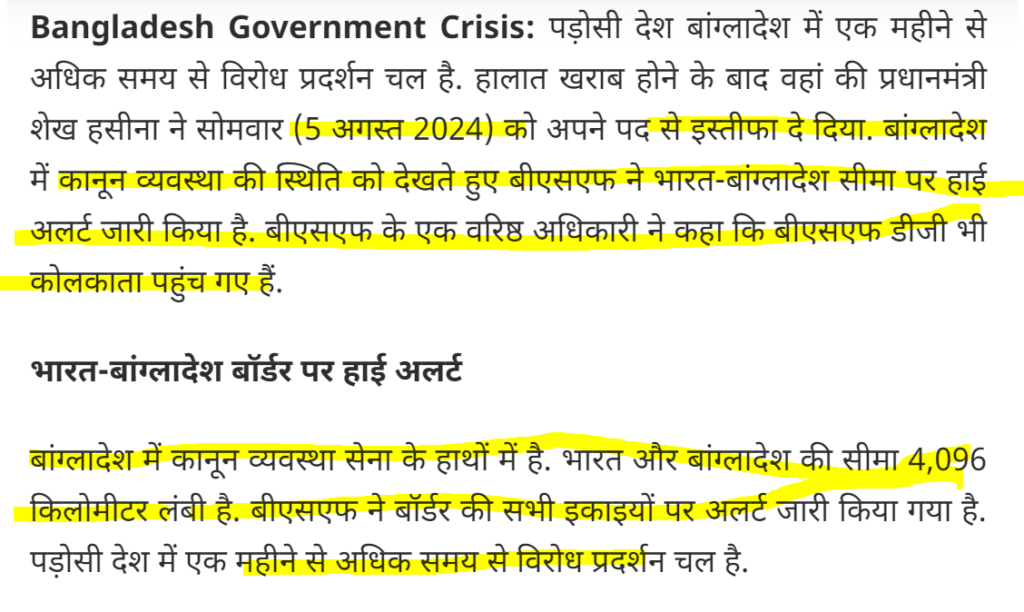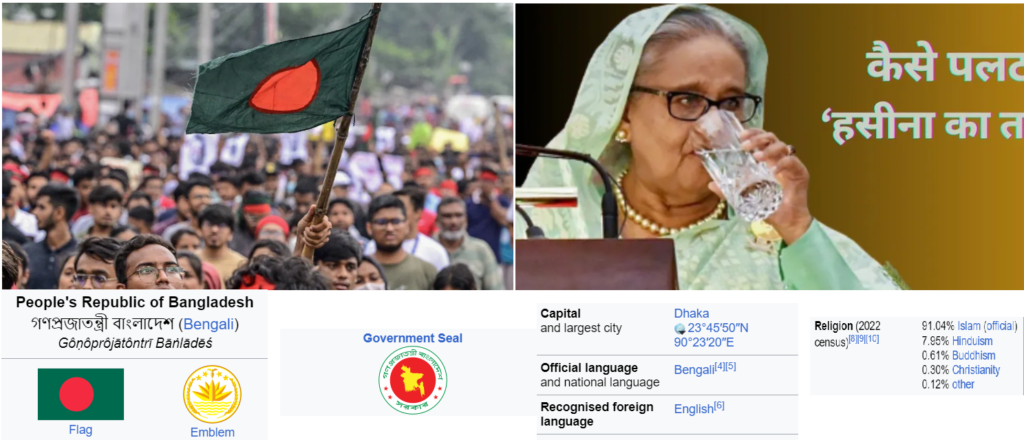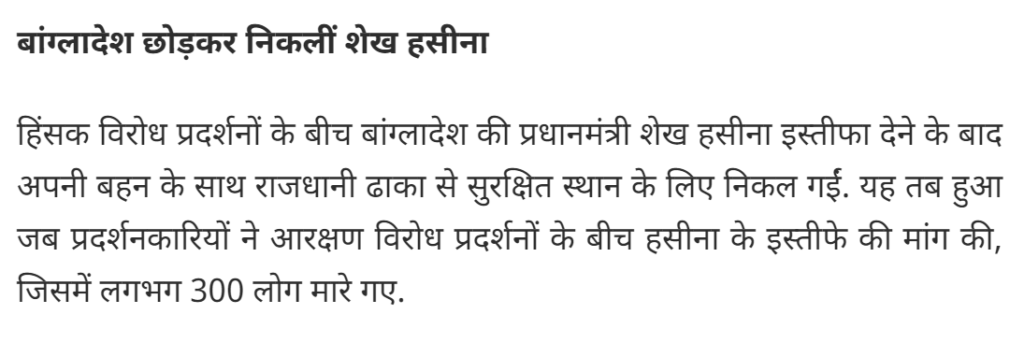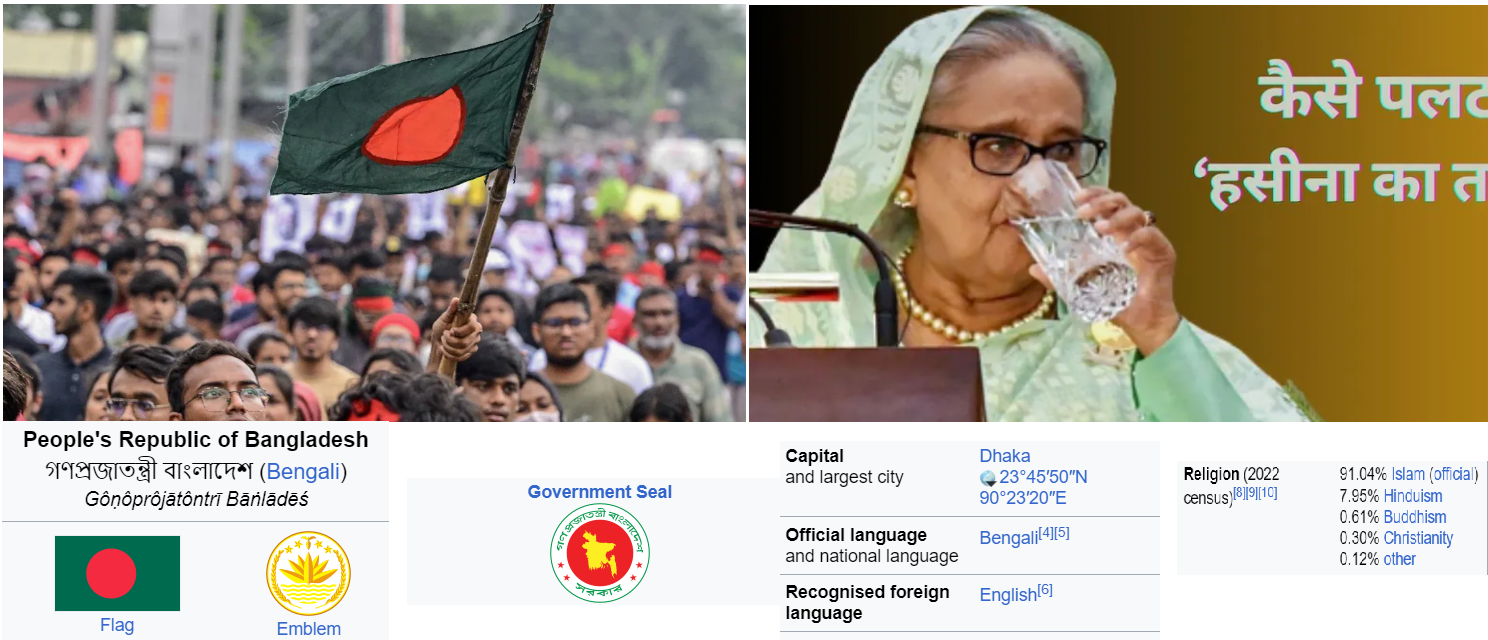BANGLADESH ME KYA HUA TAKHTA PALAT KYO HUA (बांग्लादेश में क्या हुआ तख्त पलट क्यों हुआ)
BANGLADESH ME KYA HUA TAKHTA PALAT KYO HUA : Bangladesh is a country in South Asia, located on the northern coast of the Bay of Bengal. It’s bordered by India to the west, north, and east, and shares a southeastern border with Myanmar. The capital and largest city is Dhaka. Bangladesh has a rich cultural heritage and a vibrant history. It gained independence from Pakistan in 1971 after a brutal liberation war. The country is known for its lush green landscapes, numerous rivers, and diverse wildlife. The official language is Bengali (Bangla), and the majority of the population practices Islam, with Hinduism being the second-largest religion. Bangladesh has a growing economy with key sectors including textiles, agriculture, and remittances from abroad. Despite facing challenges like poverty and climate change impacts, the country has made significant strides in education, health, and economic development in recent years. Bangladesh’s geographical features include the world’s largest river delta, the Sundarbans, which is a UNESCO World Heritage Site. The Sundarbans are home to the Bengal tiger and a wide range of other wildlife, making it a crucial area for biodiversity conservation. Culturally, Bangladesh is renowned for its rich traditions in literature, music, and art. The Bengali language has a profound literary heritage, with figures like Rabindranath Tagore and Kazi Nazrul Islam making significant contributions. Tagore, in particular, was awarded the Nobel Prize in Literature in 1913. BANGLADESH ME KYA HUA TAKHTA PALAT KYO HUA
- The country’s traditional festivals include Pohela Boishakh (Bengali New Year), Durga Puja, and Eid al-Fitr. These festivals are marked by colorful celebrations, vibrant parades, and various cultural activities.
- In terms of development, Bangladesh has shown impressive growth in areas like the garment industry, which is a major global player. The country has also made progress in improving health indicators and reducing poverty, although challenges remain.
- Bangladesh faces environmental challenges such as flooding, cyclones, and rising sea levels due to climate change. The government and various organizations are working on adaptation and mitigation strategies to address these issues.
- In summary, Bangladesh is a country with a rich cultural heritage, dynamic economic growth, and a complex set of challenges and opportunities as it continues to develop and modernize.

Economy and Industry :BANGLADESH ME KYA HUA TAKHTA PALAT KYO HUA
Bangladesh has experienced robust economic growth over the past few decades. The country is often cited as one of the world’s fastest-growing economies. The garment industry is a key driver of this growth, making Bangladesh one of the largest textile exporters globally. This sector provides employment for millions and has been crucial in the country’s economic development.
In addition to textiles, remittances from Bangladeshi workers abroad play a significant role in the economy. The country has a growing information technology sector and has made strides in digital innovation and entrepreneurship. The government has set ambitious goals for infrastructure development and energy production to support continued economic growth. BANGLADESH ME KYA HUA TAKHTA PALAT KYO HUA
Education and Health :BANGLADESH ME KYA HUA TAKHTA PALAT KYO HUA
Bangladesh has made significant progress in education and healthcare. The literacy rate has improved markedly over the years, and there have been concerted efforts to increase enrollment in schools and improve the quality of education. Health indicators such as life expectancy and child mortality rates have also seen substantial improvements.

Environmental and Social Issues
Despite progress, Bangladesh faces ongoing challenges related to environmental sustainability. The country is highly vulnerable to natural disasters like cyclones and floods, which are exacerbated by climate change. Coastal erosion and salinization of soil are additional concerns impacting agriculture and livelihoods.
Social issues, including gender inequality and poverty, remain areas of concern. However, there have been positive developments, such as increased female participation in the workforce and advancements in women’s rights. BANGLADESH ME KYA HUA TAKHTA PALAT KYO HUA
Tourism and Culture :BANGLADESH ME KYA HUA TAKHTA PALAT KYO HUA
Tourism in Bangladesh is growing, with visitors attracted to its natural beauty and cultural heritage. Sites like the historical city of Bagerhat, the ancient ruins of Mahasthangarh, and the picturesque hill tracts in the Chittagong region offer unique experiences. The country’s vibrant festivals, traditional crafts, and rich culinary traditions also draw interest.
Political Landscape
Bangladesh has a dynamic political landscape with a history of both democratic elections and periods of political instability. The country has a parliamentary democracy, and political power is primarily held by two major parties: the Awami League and the Bangladesh Nationalist Party (BNP). Political developments and shifts in leadership can significantly impact the country’s policy directions and economic environment.
Future Prospects
Looking ahead, Bangladesh is poised to continue its development trajectory, with efforts to address environmental challenges and further improve infrastructure, education, and healthcare. The country’s youthful population and growing middle class are expected to drive future economic growth and innovation.
In summary, Bangladesh is a nation of resilience and transformation, balancing its rich cultural heritage with modern development challenges and opportunities.
Cultural Heritage and Arts :BANGLADESH ME KYA HUA TAKHTA PALAT KYO HUA
- Bangladesh’s cultural heritage is a tapestry of traditions, arts, and customs. The country has a vibrant tradition of folk music, including Baul and Lalon music, which reflect its rich spiritual and social history. Traditional dance forms, such as the classical dance of Kathak and folk dances like the Jatra, are integral to cultural festivals and ceremonies.
- The craft industry is another significant aspect of Bangladeshi culture. The production of handwoven textiles, such as the famous Jamdani sarees and muslin fabric, showcases the country’s long-standing tradition in weaving. Pottery, brasswork, and traditional bamboo and cane crafts also contribute to the nation’s cultural economy.
Historical Legacy
Bangladesh’s history is marked by a series of significant events that have shaped its identity. The ancient city of Paharpur, with its Buddhist Vihara, and the historic mosque city of Bagerhat are testament to the country’s rich historical and architectural legacy. These sites reflect the influence of various civilizations that have passed through the region. BANGLADESH ME KYA HUA TAKHTA PALAT KYO HUA
The 1971 Liberation War is a pivotal moment in Bangladesh’s modern history. The struggle for independence from Pakistan was a defining event that shaped the national identity and collective memory of the Bangladeshi people. The Liberation War Museum in Dhaka is dedicated to preserving the history and memories of this crucial period. BANGLADESH ME KYA HUA TAKHTA PALAT KYO HUA
Cuisine :BANGLADESH ME KYA HUA TAKHTA PALAT KYO HUA
- Bangladeshi cuisine is diverse and flavorful, characterized by its use of spices, herbs, and fresh ingredients. Rice and fish are staples of the Bangladeshi diet, often complemented by lentils, vegetables, and meats.
- Signature dishes include Hilsa fish curry, Bhuna Khichuri (a spiced rice and lentil dish), and various types of biryanis.
- Street food culture is also vibrant, with popular items such as Fuchka (puffed rice balls filled with spicy tamarind water), Chotpoti (a tangy snack made from peas), and Jhalmuri (spicy puffed rice) being widely enjoyed.
Modern Challenges and Innovations
Bangladesh faces a range of modern challenges, including urbanization pressures, infrastructure needs, and social inequality. However, the country is also showing innovation and resilience. There are numerous initiatives aimed at improving rural development, education, and health services through technology and community-based programs.
For example, the use of mobile technology has significantly impacted financial inclusion in Bangladesh. The widespread adoption of mobile banking services has facilitated access to financial resources for many people, including those in remote areas.
International Relations
- Bangladesh maintains an active role in international diplomacy and regional cooperation. It is a member of various international organizations, including the United Nations and the South Asian Association for Regional Cooperation (SAARC). The country has sought to strengthen ties with neighboring countries and engage in global discussions on climate change, development, and security.
Sustainable Development Goals (SDGs)
Bangladesh is committed to achieving the United Nations Sustainable Development Goals (SDGs). The government and various stakeholders are working on initiatives related to poverty reduction, clean water and sanitation, renewable energy, and gender equality, aligning with the global agenda for sustainable development.
Future Outlook
- The future of Bangladesh looks promising, with continued economic growth, increasing regional influence, and ongoing efforts to address social and environmental challenges. The country’s youthful population, combined with a growing emphasis on innovation and education, provides a strong foundation for future development.
- In summary, Bangladesh is a dynamic and evolving nation with a rich cultural heritage, significant historical milestones, and a rapidly developing economy. The interplay between tradition and modernity, along with the ongoing efforts to overcome challenges, will likely shape the country’s trajectory in the coming years.

Youth and Demographics
Bangladesh has a youthful population, with a median age around 28 years. This demographic advantage presents both opportunities and challenges. The large number of young people can drive innovation and economic growth if harnessed effectively. Educational initiatives, vocational training, and employment opportunities are crucial to ensuring that this youthful workforce contributes positively to the economy.
Technology and Innovation
The technology sector in Bangladesh has seen significant growth in recent years. The government has promoted digital inclusion through initiatives like “Digital Bangladesh,” which aims to integrate technology into government services, education, and daily life. The country has a burgeoning startup ecosystem, particularly in fintech, edtech, and agritech sectors. Innovations in mobile technology and internet access are playing a key role in improving business practices and everyday life.
Agriculture and Rural Development
Agriculture remains a cornerstone of Bangladesh’s economy, employing a substantial portion of the population. The country’s agriculture is diverse, with major crops including rice, jute, tea, and potatoes. Efforts are underway to modernize agriculture through improved irrigation techniques, high-yield crop varieties, and better access to markets for farmers.
Rural development initiatives aim to enhance living standards in rural areas by improving infrastructure, healthcare, and education. Programs focusing on rural entrepreneurship and microfinance are helping to boost local economies and reduce poverty.
Urbanization and Infrastructure
Rapid urbanization is transforming cities like Dhaka and Chittagong. While this growth brings economic opportunities, it also presents challenges such as congestion, pollution, and strain on infrastructure. The government is investing in urban planning and infrastructure projects, including the construction of new roads, bridges, and public transport systems. The Dhaka Metro project, for example, aims to alleviate traffic congestion and improve connectivity.
Environmental Conservation
Bangladesh faces significant environmental challenges, particularly due to its low-lying geography and vulnerability to climate change. Efforts to combat environmental degradation include reforestation projects, river management initiatives, and coastal protection programs. The government and various NGOs are working on projects to enhance resilience to natural disasters and reduce the impacts of climate change.
International Aid and Development Partnerships
International aid and development partnerships play a vital role in supporting Bangladesh’s growth. The country receives assistance from various international organizations, including the World Bank, the International Monetary Fund (IMF), and United Nations agencies. These partnerships help fund projects related to education, healthcare, infrastructure, and disaster relief.
Human Rights and Social Justice
Human rights and social justice remain critical areas of focus. Efforts are being made to address issues such as child labor, gender inequality, and workers’ rights, particularly in the garment industry. Civil society organizations and activists are working to promote human rights and advocate for marginalized communities.
Cultural Exchange and Global Presence
Bangladesh has been making strides on the global stage, enhancing its cultural and diplomatic presence. International cultural festivals, trade fairs, and diplomatic engagements help showcase the country’s heritage and potential. The Bangladeshi diaspora, spread across many countries, plays a significant role in fostering cultural exchange and international relations.
Future Prospects and Vision
Looking ahead, Bangladesh aims to continue its trajectory of growth and development while addressing ongoing challenges. Visionary goals include becoming a middle-income country by 2026 and achieving developed nation status by 2041. Achieving these objectives will require sustained efforts in areas like economic diversification, infrastructure development, education, and social inclusion.
In summary, Bangladesh is a country of dynamic transformation, with a rich cultural heritage and a forward-looking vision. The interplay between its historical legacy, modern innovations, and the challenges it faces will shape its future trajectory, positioning it as a key player in the region and the global community.
Healthcare and Public Health
Bangladesh has made notable strides in healthcare, improving access to medical services and advancing public health. The government has implemented various health programs to address issues such as maternal and child health, infectious diseases, and malnutrition. Initiatives like the Expanded Programme on Immunization (EPI) have been successful in increasing vaccination coverage.
There is also a growing emphasis on addressing non-communicable diseases (NCDs) such as diabetes, cardiovascular diseases, and cancer. Efforts are underway to strengthen the healthcare infrastructure, improve diagnostic and treatment facilities, and increase public awareness about health issues.
Education and Skills Development
The education sector in Bangladesh has seen significant improvements in enrollment rates and literacy levels. The government is working on enhancing the quality of education through curriculum reforms, teacher training, and infrastructure development.
Skills development is a key focus, with vocational and technical training programs designed to equip the workforce with the skills needed for a rapidly changing job market. Partnerships with industries and educational institutions aim to align training programs with market demands.
Women’s Empowerment
Women’s empowerment is a critical area of focus in Bangladesh. Efforts to promote gender equality include initiatives to improve women’s access to education, healthcare, and economic opportunities. Programs aimed at increasing women’s participation in the workforce and leadership positions are helping to drive social and economic change.
The government and various organizations are working to address issues such as gender-based violence, child marriage, and discriminatory practices. Empowering women is seen as essential for achieving broader social and economic development goals.
Sustainable Development and Green Economy
- Sustainability is becoming an integral part of Bangladesh’s development strategy. The country is investing in green technologies and renewable energy sources to reduce dependence on fossil fuels and mitigate environmental impact. Solar energy, for instance, is being promoted as a solution for rural electrification.
- Efforts to promote sustainable agricultural practices, waste management, and conservation of natural resources are also part of the broader sustainability agenda. The goal is to balance economic growth with environmental stewardship and create a more sustainable future.
Tourism Development
- Tourism in Bangladesh is gradually expanding, with a focus on developing infrastructure and promoting key destinations. The natural beauty of the country, including its rivers, forests, and beaches, offers significant potential for eco-tourism and adventure tourism.
- Promoting historical and cultural sites, such as the ancient city of Mahasthangarh, the architectural wonders of Bagerhat, and the vibrant festivals, helps attract visitors and boost the tourism sector. Efforts are being made to improve hospitality services and marketing to enhance the visitor experience.
Regional Cooperation and Trade
- Bangladesh is actively involved in regional cooperation through organizations like the South Asian Association for Regional Cooperation (SAARC) and the Bay of Bengal Initiative for Multi-Sectoral Technical and Economic Cooperation (BIMSTEC). These platforms facilitate collaboration on trade, economic development, and regional security.
- Trade agreements and partnerships with neighboring countries and global markets are essential for boosting exports and fostering economic growth. Bangladesh is also focusing on improving trade logistics and infrastructure to enhance its position in the global supply chain.
Civic Engagement and Governance
- Civic engagement and good governance are vital for sustainable development. Bangladesh is working to strengthen democratic institutions, promote transparency, and enhance public sector accountability. Civil society organizations play an active role in advocating for rights, monitoring governance, and promoting social justice.
- Efforts to improve governance include anti-corruption measures, legal reforms, and initiatives to increase citizen participation in decision-making processes. Strengthening democratic practices and institutions contributes to a more inclusive and equitable society.
Future Prospects and Ambitions
- As Bangladesh looks to the future, it aims to build on its successes and address existing challenges with a focus on inclusive development, innovation, and sustainability. Key ambitions include achieving middle-income status, improving quality of life, and enhancing global competitiveness.
- Investment in human capital, infrastructure, and technology will be crucial for realizing these ambitions. Collaboration between the government, private sector, and civil society will drive progress and ensure that the benefits of development are widely shared.
- In summary, Bangladesh is a nation on a transformative journey, balancing growth and development with efforts to address social, environmental, and economic challenges. With its rich cultural heritage, youthful population, and commitment to progress, the country is well-positioned to make significant strides in the coming years.

